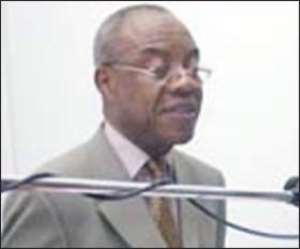
Dr Joe Abbey-Executive Director, CEPA THE CENTRE for Policy Analysis (CEPA) has called for the employment of an accelerated growth paradigm with macro-economic stability for Ghana instead of the World Bank/International Monetary Fund's pattern of macroeconomic stability.
Making the call in its recent report, “The current state of the macro-economy of Ghana: 2000-2009”, CEPA underlined the need for Government to devise local solutions to offset the impact of the global financial crisis on Ghana, target the Asian type growth rates that range between 7 and 9 percent and discard the IMF's medium-term growth projections of between 5 and 6.5 percent.
Dr Joe Abbey, Executive Director, CEPA, who read the report, said:
“Solutions must be sought in the context of the current global financial crisis and also the downgrading of Ghana's sovereign ratings, both of which make foreign direct investment as well as external borrowing from international markets, even on commercial terms more difficult to obtain.”
According to him, the country's fiscal performance began to deteriorate on the wings of a higher-than-budgeted-for public sector wage bill and subsidies to the petroleum, water and electricity sub-sectors.
And this caused Ghana to dive into fiscal excesses after the first ever peaceful transition in 2001 resulting in government's failure and abandonment of a 3-year economic programme (1999-2002) with the IMF under its Poverty Reduction and Growth Facility (PRGF).
A successor programme which required the removal of petroleum price commodities as a conditionality, was agreed on between the IMF and Government for 2003 to 2005 but given the high social and political costs involved, the policy could not be consistently implemented.
As a result, subsequent increases in international prices of petroleum products were not fully passed onto domestic consumers cumulating in significant losses and debt at the Tema Oil Refinery to the tune of about GH¢1.4 billion.
“The Government of Ghana, apparently could not countenance any such domestic price increases since according to it that could be politically destabilizing. Thus, in January 2005, with the 2004 elections out of the way, petroleum product prices were increased on average by 50 percent.
“These experiences in the oil sector concerned with subsidies, fiscal discipline and macroeconomic stability, serve to illustrate the futility and unsustainability of pursuing the strategy of macroeconomic stability with growth. They also show the possible high cost of procrastination in responding to shocks whose consequences linger on.”
Over the period from 2005 to 2008, the budget performed continually much worse than planned. The overall balance has registered deficits which have widened from about 3 percent of national income in 2005 to 7.8 percent of national income in the following year, 2006 – far above its target in the budget and over two and a half times the previous outcome.
This outcome, termed a fiscal surprise by the rating agency, Fitch, was cited as the reason for its downgrading of Ghana's sovereign rating in 2007.
Thus, the primary reason for the deteriorating fiscal performance over the last four years was the rapid growth of expenditure. In each of these years, expenditure rose faster than national income and overshot the budgetary provision by considerable margins.
From a share of 26 percent of national income in 2005, the share of domestic expenditure in national income (excluding foreign-financed expenditure) rose to 30.1 percent in 2006, and then to an estimated 30.7 percent in 2007.
For 2008, CEPA estimates 38 percent of national income.
By Samuel Boadi




 Former Kotoko Player George Asare elected SRC President at PUG Law Faculty
Former Kotoko Player George Asare elected SRC President at PUG Law Faculty
 2024 elections: Consider ‘dumsor’ when casting your votes; NPP deserves less — P...
2024 elections: Consider ‘dumsor’ when casting your votes; NPP deserves less — P...
 You have no grounds to call Mahama incompetent; you’ve failed — Prof. Marfo blas...
You have no grounds to call Mahama incompetent; you’ve failed — Prof. Marfo blas...
 2024 elections: NPP creates better policies for people like us; we’ll vote for B...
2024 elections: NPP creates better policies for people like us; we’ll vote for B...
 Don’t exchange your life for wealth; a sparkle of fire can be your end — Gender ...
Don’t exchange your life for wealth; a sparkle of fire can be your end — Gender ...
 Ghana’s newly installed Poland train reportedly involved in accident while on a ...
Ghana’s newly installed Poland train reportedly involved in accident while on a ...
 Chieftaincy disputes: Government imposes 4pm to 7am curfew on Sampa township
Chieftaincy disputes: Government imposes 4pm to 7am curfew on Sampa township
 Franklin Cudjoe fumes at unaccountable wasteful executive living large at the ex...
Franklin Cudjoe fumes at unaccountable wasteful executive living large at the ex...
 I'll 'stoop too low' for votes; I'm never moved by your propaganda — Oquaye Jnr ...
I'll 'stoop too low' for votes; I'm never moved by your propaganda — Oquaye Jnr ...
 Kumasi Thermal Plant commissioning: I pray God opens the eyes of leaders who don...
Kumasi Thermal Plant commissioning: I pray God opens the eyes of leaders who don...
